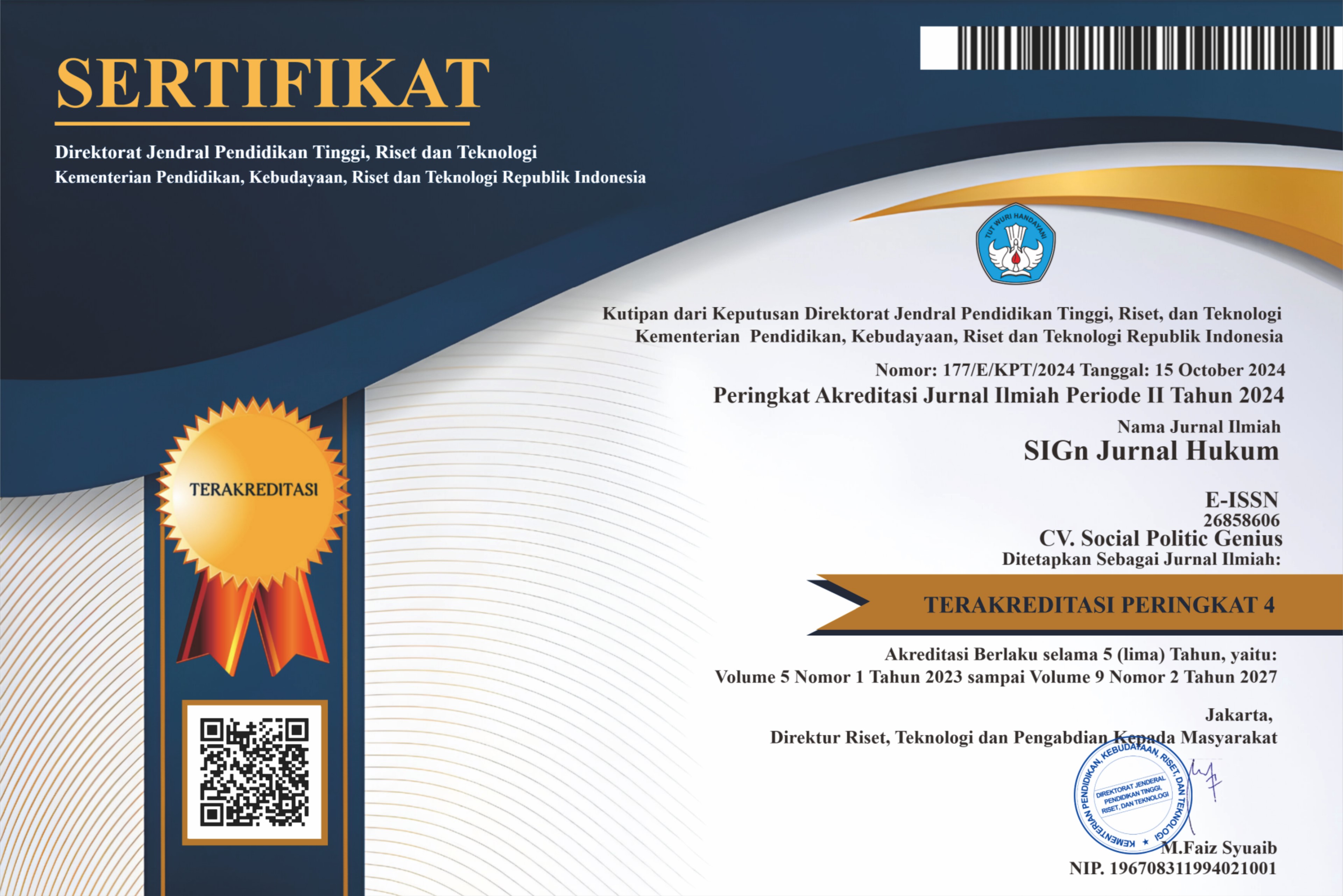Refusal of Cash Payments in Transactions: The Sharia Economic Law Review on Business Practices at Mulia Coffeenary
Abstract
Digital payment innovations have prompted business actors to implement exclusive non-cash transaction policies. However, this practice raises significant juridical and ethical problems. This research aims to critically analyze the policy of cash payment refusal through a case study at Mulia Coffeenary. The study employs an empirical legal research method, anchored by a primary review from the perspective of Sharia Economic Law. The results of the analysis indicate that this policy conflicts with the mandate of Rupiah sovereignty as outlined in Law Number 7 of 2011. Furthermore, the practice infringes upon the consumer’s right to choose, which is guaranteed by Law Number 8 of 1999. From a sharia review, the practice is found to be inconsistent with the principle of mutual consent (‘an tarāḍin minkum) in contracts and the legal maxim prohibiting harm (lā ḍarar wa lā ḍirār) to specific segments of society. It is concluded that the business rationale of efficiency and security cannot justify disregarding legal norms and transactional ethics. Therefore, this study recommends a model of coexistence between cash and digital payments to ensure broader financial inclusion and justice.
Downloads
References
Aman, I., Yuvita, Y., & Hafd, A. (2023). Efektivitas Penggunaan Quick Response Indonesia Standard (QRIS) di Pasar Tradisional Pabaeng-Baeng Kota Makassar. eCo-Buss, 6(2), 870-881. https://doi.org/10.32877/eb.v6i2.1052
Aziz, Y. (2024). Mobile Application System for Point of Sales in Coffee Sales at Langit Coffee Space. Jurnal Inovtek Polbeng Seri Informatika, 9(2), 916-926. https://doi.org/10.35314/tb6adx44
Cahyaning, E. K., & Puspawati, R. A. (2024). Systematic Literature Review (SLR): Efektivitas Penggunaan QRIS sebagai Alat Transaksi. Ratio: Reviu Akuntansi Kontemporer Indonesia, 5(2), 90-97. https://doi.org/10.30595/ratio.v5i2.21989
Fatwa of the National Sharia Board Number 116/DSN-MUI/IX/2017 on Sharia Electronic Money. https://putusan3.mahkamahagung.go.id/peraturan/detail/11e9da0c9217995ebfd6313930353133.html
Gadjong, A. A. (2023). The Agreement of Personal Shopping Service through E-Commerce Platforms: A Case Study of Consumer Protection. SIGn Jurnal Hukum, 4(2), 388-401. https://doi.org/10.37276/sjh.v4i2.230
Heriani, F. N. (2021, February 4). Begini Pengaturan Penggunaan Mata Uang Rupiah di Indonesia. Hukumonline. Retrieved May 18, 2025, from https://www.hukumonline.com/berita/a/begini-pengaturan-penggunaan-mata-uang-rupiah-di-indonesia-lt601bde50f1dc3
Irfa’i, M. (2022). Tinjauan Hukum Islam Terhadap Quick Response Code Indonesian Standard (QRIS) Sebagai Sistem Pembayaran Digital (Studi Kasus di Pasar Manis Purwokerto) [Bachelor Thesis, Universitas Islam Negeri Profesor Kiai Haji Saifuddin Zuhri Purwokerto]. Repository UIN Profesor Kiai Haji Saifuddin Zuhri. https://repository.uinsaizu.ac.id/14955
Kudu, Y. U., Pakereng, Y. M., & Kelen, L. H. S. (2023). Efektivitas Penggunaan Payment QRIS Pada Transaksi Penjualan Usaha Mikro, Kecil dan Menengah. Juremi: Jurnal Riset Ekonomi, 3(2), 195-210. Retrieved from https://bajangjournal.com/index.php/Juremi/article/view/6440
Lajnah Pentashihan Mushaf Al-Qur’an. (2022). Qur’an Kemenag. Ministry of Religious Affairs of the Republic of Indonesia. https://quran.kemenag.go.id
Law of the Republic of Indonesia Number 8 of 1999 on Consumer Protection (State Gazette of the Republic of Indonesia of 1999 Number 22, Supplement to the State Gazette of the Republic of Indonesia Number 3821). https://www.dpr.go.id/dokumen/jdih/undang-undang/detail/409
Law of the Republic of Indonesia Number 7 of 2011 on Currency (State Gazette of the Republic of Indonesia of 2011 Number 64, Supplement to the State Gazette of the Republic of Indonesia Number 5223). https://www.dpr.go.id/dokumen/jdih/undang-undang/detail/244
Mas’ud, M. u., & Agustian, R. (2022). Jaminan E-Money pada Pariwisata Sariater Subang Menurut Tinjauan Hukum Ekonomi Syariah. Al-Muamalat: Jurnal Ekonomi Syariah, 9(2), 74-83. https://doi.org/10.15575/am.v9i2.19255
Maulana, D. R., Bakar, A., & Ulya, N. H. (2024). Analisis Fatwa DSN-MUI No. 116/DSN-MUI/IX/2017 tentang Uang Elektronik Syariah Terhadap Praktik Penggunaan Aplikasi Dana. Al-Aqad: Journal of Shariah Economic Law, 4(1), 528-532. https://doi.org/10.24260/al-aqad.v4i1.2776
Miles, M. B., & Huberman, A. M. (1992). Analisis Data Kualitatif: Buku Sumber tentang Metode-Metode Baru (Trans. by T. R. Rohidi). UI Press.
Nagri, E. P. (2021). Peran Digitalisasi Ekonomi dalam Perspektif Islam. Journal of Practice Learning and Educational Development, 1(4), 171-175. https://doi.org/10.58737/jpled.v1i4.25
Pinara, D., Alif, M., & Lisalam, R. H. (2025). Transaksi Non Tunai dalam Perspektif Hadis: Antara Inovasi Digital dan Prinsip Syariah. Al-Mu’tabar, 5(1), 19-34. Retrieved from https://jurnal.stain-madina.ac.id/index.php/almutabar/article/view/2302
Putri, S. A., & Rahmanto, D. N. A. (2023). Analisis Efektivitas Penggunaan Quick Response Code Indonesian Standard (QRIS) sebagai Alat Pembayaran Non Tunai pada Bank Syariah Indonesia KCP Godean 2. El-Mal: Jurnal Kajian Ekonomi dan Bisnis Islam, 5(1), 456-476. https://doi.org/10.47467/elmal.v5i1.427
Putri, T. E., & Basir, G. (2023). Efektivitas Quick Response Code Indonesian Standard (QRIS) di Pasar Atas Kota Bukittinggi Ditinjau dari Ekonomi Islam. Maslahah: Jurnal Manajemen dan Ekonomi Syariah, 1(3), 280-289. https://doi.org/10.59059/maslahah.v1i3.276
Qamar, N., & Rezah, F. S. (2020). Metode Penelitian Hukum: Doktrinal dan Non-Doktrinal. CV. Social Politic Genius (SIGn).
Ramadhan, B. H. (2024). Perlindungan Hukum Atas Penyalahgunaan Data Pelaku Usaha dalam Pembuatan QRIS Perorangan (Studi Kasus Transaksi QRIS Pada Merchant Food Street Corndog Cihuy) [Bachelor Thesis, Universitas Islam Negeri Syarif Hidayatullah]. UIN Syarif Hidayatullah Institutional Repository. https://repository.uinjkt.ac.id/dspace/handle/123456789/79466
Sampara, S., & Husen, L. O. (2016). Metode Penelitian Hukum. Kretakupa Print.
Sherlyani, G. F. A., & Andriasari, W. S. (2023). Implementasi Transaksi Pembayaran Cashless dengan Quick Response Code Indonesian Standard (QRIS). Jurnal Ekonomi dan Bisnis Islam, 1(3), 314-326. https://doi.org/10.21043/jebisku.v1i3.301
Situngkir, R. (2018). Penggunaan E-Money Berdasarkan Undang-Undang Nomor 7 Tahun 2011 tentang Mata Uang. De Lega Lata: Jurnal Ilmu Hukum, 3(1), 52-59. https://doi.org/10.30596/dll.v3i1.3150
Susanti, N. E. (2024). Tanggung Jawab Pelaku Usaha Terhadap Transaksi Jual Beli Menggunakan Quick Respone Code Indonesia Standard (QRIS) Perspektif Etika Bisnis Islam. Journal Islamic Studies, 2(2), 278-290. https://doi.org/10.71456/jis.v2i2.885
Traa, I. K. K. B., & Djaja, B. (2023). Perlindungan Konsumen Terhadap Transaksi Pembayaran Tertunda Melalui Quick Response Code Indonesian Standard (QRIS). Alauddin Law Development Journal, 5(3), 596-603. https://doi.org/10.24252/aldev.v5i3.38673
Tsabitah, H., Ridwani, N. A., Ardita, M. P., & Hamzi, Y. H. (2025). Analisis Penerapan Sistem Cashless-Only terhadap Hak Konsumen Berdasarkan UU dan Prinsip Syariah. Wanargi: Jurnal Manajemen dan Akuntansi, 2(2), 70-84. Retrieved from https://jurnalistiqomah.org/index.php/wanargi/article/view/3017
Zainuri, M., & Ruski, R. (2025). Implementation of the Quick Response Code Indonesia Standard (QRIS) Payment System as a Medium for Digital Financial Literacy Education in Coffee Shops. Journal of Practice Learning and Educational Development, 5(2), 557-561. https://doi.org/10.58737/jpled.v5i2.471
Copyright (c) 2025 Muhammad Rafi Desvrianto, Hisyam Asyiqin, Abdul Muiz Nuroni

This work is licensed under a Creative Commons Attribution 4.0 International License.

















